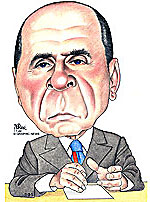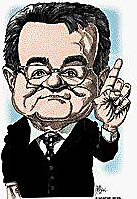
| Media Rules & Rulers |
 |
followthemedia.com - a knowledge base for media professionals |
|
|
AGENDA
|
||
“One way to judge which way the (Italian political) wind is blowing is to keep a close eye on the RAI privatization.” – FTM, Jan.1, 2005; RAI Privatization Dead -- Oct. 27, 2005The more Italian Prime Minister Silvio Berlusconi’s center-right coalition dropped in the opinion polls for next April’s election, and the more Romano Prodi’s center-left coalition gathered popularity, the more the privatization of state broadcaster RAI was in doubt. Now it is dead.
|
| ftm background |
|
Television, Italian Style: Rupert Murdoch Learns That Prime Minister Berlusconi Is a Worthy Opponent Italian Football Score: Berlusconi 1 Murdoch 0 Berlusconi Family Adds Radio to Media Holding News Anchors Sudden Firing Stuns Italians, Media Watchers “It’s Pointed and a Bit Uncomfortable” |
Parliament, controlled by Berlusconi’s coalition, had passed a media law last year that included a RAI privatization with the initial goal being to put some 30% up for grabs, but, to keep the likes of Rupert Murdoch at bay, no one investor could control more than 1% of the shares.
At the time, it seemed a pretty good financial idea. RAI’s first half profit in 2004 was some €82 million and even though profit slowed in the second half it finished the year €113 million in the black, according to RAI officials. In other words, it was in good shape to be sold off.
But something dramatic happened both financially and politically since then.
Financially, big profit suddenly turned to big losses. Alfredo Meocci, the new RAI director gerneral, told a Parliamentary committee last week that RAI was going to lose around €80 million next year. No explanation for such a financial disaster, but seeing as no one would want to buy into such a money-losing proposition he told the committee “RAI’s privatization is de facto suspended.”
Politically, the plan was in trouble from the beginning. First the Antitrust Authority opposed (but had no legal recourse) a straight RAI privatization. The Authority wanted RAI split into two with the license fee paying for the money-losing public sector broadcasting (to ensure there was enough funding for public affairs programming),, and advertising paying for rthe entertainment programs that people really wanted to see. Prodi climbed immediately onto that bandwagon that has gained much favor.

©www.graphicnews.com, permission granted
Berlusconi has been heavily criticized because of his defacto control over some 90% of the Italian television market. As prime minister he appoints the directors to RAI that has about 29% of the Italian television advertising business and a 45% share of the audience. Berlusconi, Italy’s richest businessman and said to be the seventh richest man in the world – also controls Mediaset, a media company that receives about 65% of the country’s television advertising revenues via three terrestrial television stations that have about a 45% share of viewers.
Mediaset is also active on the digital television platform, made possible by the Berlusconi government’s subsidy of more than half the cost of some 3 million desktop decoders now in distribution (that policy being appealed to the EC by Rupert Murdoch who runs the Sky Italia satellite service in opposition to the Mediaset digital platform). And let’s not forget the family also owns the country’s largest advertising agency.
Berlusconi has always denied he wields too much broadcast power. “They accuse me of controlling the six main national TV channels when the truth is there for everyone to see,” he said recently “It’s entertainment programs above all; when they deal with social or political issues they contain more criticism than appreciation of the government.”
Apart from the RAI privatization, Berlusconi has a few other broadcast problems on his hands. Foremost, last week a court began, and then postponed until Nov.7, a hearing on whether Berlusconi and 13 others should be indicted, following a four-year investigation, for alleged tax fraud, false accounting and embezzlement at Mediaset.
In Italy a judge decides whether the prosecution has a case that should be answered, and if the judge were to rule in favor of a trial it could come uncomfortably close to next year’s election. It was only about a month ago that after another Italian court acquitted the prime minister in a separate graft case.

©www.graphicnews.com, permission granted
Meanwhile, with Prodi leading the election polls by a 56%-44% margin, and an election expected next April, Berlusconi is pressing Parliament to change Italy’s equal-access media law that currently gives equal airtime to all political parties and limits the number of daily television ads. Current law also provides that the government pays for the limited political television advertising permitted before an election on commercial networks and RAI provides political advertising at no charge.
Getting rid of those commercial limitations obviously benefits the country’s richest personality. Naturally, Prodi and his allies oppose the law change and claim that Berlusconi is standing by to smother the airwaves with some €250 million of advertising if the law is changed. Berlusconi’s party counters that because of the television bias against Berlusconi in public affairs programming the opposition has no need to spend its own advertising money.
If all of that that was not enough, Berlusconi has launched also a two-prong attack on some of RAI’s recent programming that the prime minister claims are little more than personal attacks on him. Berlusconi named seven comedians he accused of using RAI to satirically make a fool of him.
Television political satire is a particularly high art much admired by Italians, but Berlusconi, apparently, is not a fan. The last time Berlusconi named names – veteran television journalist Enzo Biagi, TV presenter and journalist Michele Santoro, and satirist Daniele Luttazzi -- they were quickly banished from the RAI airwaves. This time the prime minister said that is not his intent, but he did believe those seven he named had overstepped the mark of good taste.
Prodi immediately shot into the arena and said the prime minister was trying to draw up a “blacklist”. Berlusconi denied that saying, that television “is full of programs and people who attack Berlusconi or satirize Berlusconi, often breaching the limits of truth and good taste. I cited several names off the top of my head as examples and Prodi immediately uses this to accuse me of drawing up a list of people to be banished.”
And there’s even more! A recent RAI television show, Rockpolitik, hosted by popular entertainer Adriano Celentano, 67, accused Berlusconi of muzzling the media. The program, watched by more than 11 million viewers – at one point it peaked at more than 14 million giving it a 47% share –was the second most popular entertainment show this year after a music festival final.
And if the program was not bad enough, Italy’s two largest newspapers – Corriere della Sera and La Republicca – thought the program so extraordinary being on RAI and yet so critical of the prime minister, that they each provided more than four pages of coverage running over two days.
Celentano, who at 67 is one of Italy’s most popular entertainers, refused to tell RAI managers before the show aired its exact content. He invited Santoro, one of the three banned by RAI, as a guest. Between them, they basically skewered Berlusconi. Afterwards the head of RAI1 said, “I think we all understand now why he (Celentano) refused any sort of editorial monitoring. This was not an entertainment program, it was essentially a political program.”
Even before introducing Santoro, Celentano set the scene by showing Berlusconi on an official trip to Bulgaria in 2002 denouncing the three RAI personalities. Including Santoro, who were later banned. Then Celentano introduced the American Freedom House’s survey that ranked Italy 77th in the world for press freedom, worse than the African states of Ghana, Mali and Benin, equal to Bulgaria in Europe and Mongolia in Central Asia.
La Republicca, which leans left, commented, “For one night, at least, we had the sense of a free country thanks to Celentano.” But Il Giornale, owned by Berlusconi, complained of RAI spending “€4 million for a show that was entirely against state TV, Berlusconi, the center right, and the United States.”
Mario Landolfi, the communications minister summed up the government’s position, saying there was not enough “rock” and there was too much “politik” in the program. And knowing where it hurts RAI the most, he blurted, “I’m glad I decided against increasing the RAI license fee.”
Put all of this together and shake and there can be no doubt the media festivities are just beginning in the run-up to the April election.
The largest opposition party, the Democratic Left, scorned, “Berlusconi says he is the victim of political satire – now that’s funny.” Former Italian President Francesco Cossiga was more direct, “Berlusconi doesn’t have a sense of humor.”
To the prime minister it is no laughing matter, but if he gets the media law changed before Parliament is dissolved before the next election and he floods the airwaves with his political advertising then he may be the one laughing last.
Executives at Sky Italia claim that Mediaset’s showing of Italian football on its digital platform at an a la carte price of €5 a game is having little effect on Sky’s business.
Emilio Carelli, director of Sky Italia, and Edoardo Brunetti, business affairs manager, told FTM at a sideline discussion of the News Xchange meeting in Amsterdam that Prime Minister Silvio Berlusconi's digital platform for a la carte football is not doing nearly as well as the prime minister might have hoped.
Berlusconi's Mediaset digital platform is charging 5 Euros a game, while Sky charges 33 Euros for a month's subscription. Thus a football fan watching seven or more games a month is better off with the Sky subscription deal and that includes movies, too, the executives said.
Did football on Mediaset's digital platform hurt Sky? Yes, it slowed down the rate of growth, but it is growing quite nicely all the same, and their churn is only a very enviable 5%. Also, unlike other countries where sports seems to be the main satellite driver, in football-crazy Italy it seems they are even more crazy about movies, the executives said.
Sky Italia is currently on a €400 million contract to show Italian football via satellite. MediaSet paid €86 million for the digital rights. The Sky executives left no doubt that when renegotiations take place in 2006, they expect their price and Mediaset’s price to be far closer to one another, and by that they mean Sky will look for a large reduction.
| copyright ©2005 ftm publishing, unless otherwise noted | Contact Us • Sponsor ftm |